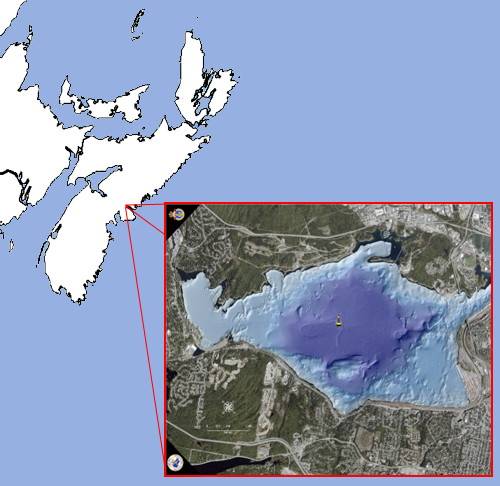Bedford Basin Scientific History
 For more than 17 years, the Bedford Institute of Oceanography (BIO) has operated the Bedford Basin Plankton Monitoring Program - a project that monitors the plankton ecosystem of Bedford Basin by visiting the same station every week to take water samples and record many water column properties. Plankton is comprised of microscopic plants and animals that form the basis of the marine food web, and as such are the lynchpins of the Basin's, and the world ocean's, ecosystem. The project has allowed BIO scientists to compile a time series of data that has become a powerful tool in revealing ecological variability at weekly, monthly, seasonal, annual and decadal time scales, and has been the basis for numerous peer reviewed publications.
For more than 17 years, the Bedford Institute of Oceanography (BIO) has operated the Bedford Basin Plankton Monitoring Program - a project that monitors the plankton ecosystem of Bedford Basin by visiting the same station every week to take water samples and record many water column properties. Plankton is comprised of microscopic plants and animals that form the basis of the marine food web, and as such are the lynchpins of the Basin's, and the world ocean's, ecosystem. The project has allowed BIO scientists to compile a time series of data that has become a powerful tool in revealing ecological variability at weekly, monthly, seasonal, annual and decadal time scales, and has been the basis for numerous peer reviewed publications.
Ocean Monitoring System
On 6th October 2009, Dalhousie University, in close collaboration with BIO, deployed an ocean monitoring system in the form of a research buoy situated near the BIO time series station. This system will permit detailed observation of many events important to the Bedford Basin plankton ecosystem that often occur on time scales too small to be captured by the weekly sampling program.
The buoy monitoring system is based on technology and expertise developed through a Canadian Foundation for Innovation (CFI) -funded system deployed and successfully operated by Dalhousie in Lunenburg Bay for five years. The buoy is equipped with surface sensors that will measure meteorological conditions, solar irradiance, and the amount of light reflected from the water. The sensors suspended beneath the buoy will measure the amount of light penetrating the water column, temperature, salinity, water clarity, oxygen, and phytoplankton concentration. Data will be collected every half hour (tbd), 24 hours a day, seven days a week, and sent wirelessly back to Dalhousie for display in near-real time on this web site. We invite you to explore our pages and do some of your own investigations! Insert link.
Scientific Directions
Dalhousie and BIO scientists are working on marrying the data acquired from weekly field visits with the real time buoy data to reveal important relationships between physical and meteorological conditions and the Basin's ecology. Both research institutes are excited by this opportunity to build on their collective expertise in ecological and real time ocean monitoring, and are confident that fundamental insights into important ecological processes will result.
Click here to see the latest data from our ocean observing station.
